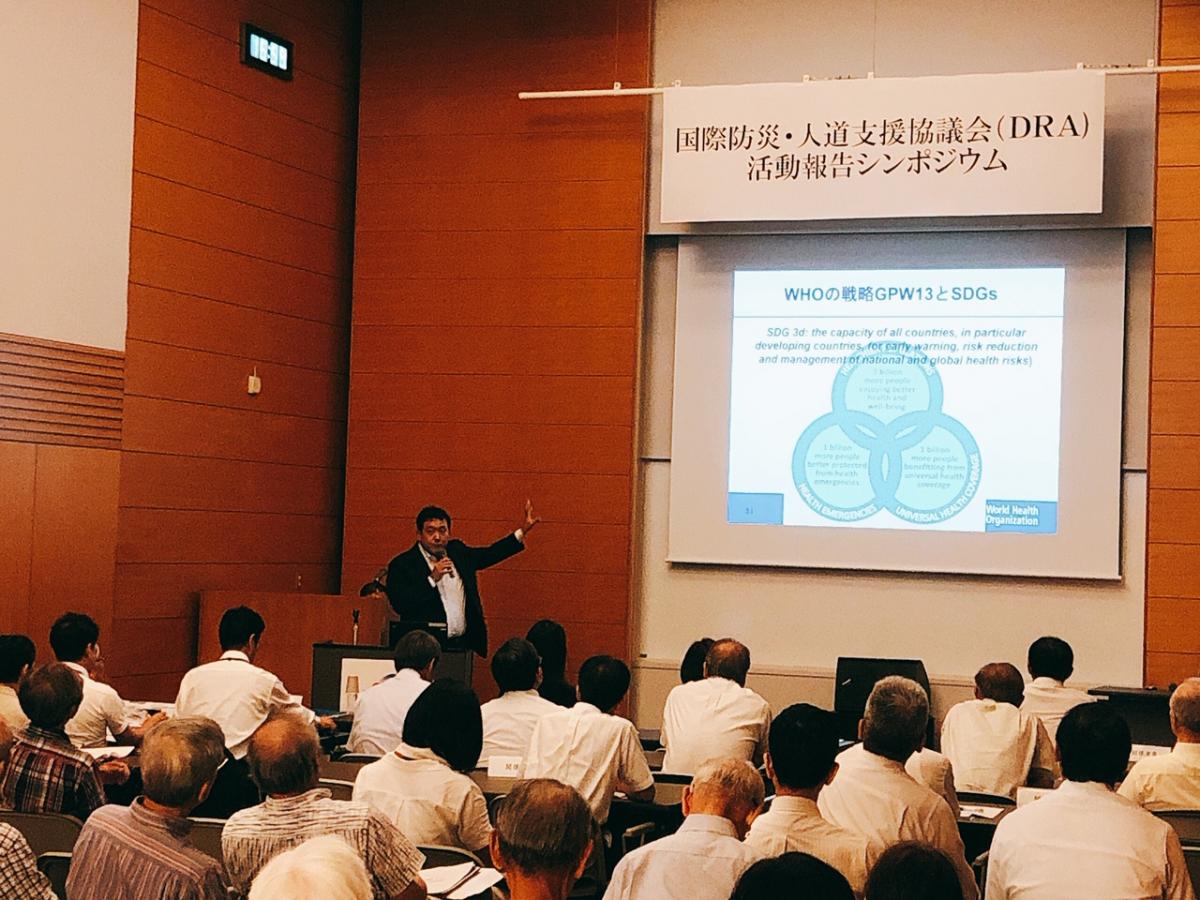2019
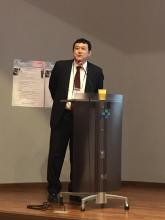
WKC presents at the 20th Korea-Japan Young Psychiatrists’ Conference 2019
The Korea-Japan Young Psychiatrists’ Conference was established to promote academic and clinical communication and collaboration between the two countries and its 20th bilateral conference was held in Seoul, Republic of Korea on 6 and 7 September 2019.
The theme of the 20th conference was “Coping with the future psychiatry” and Dr Ryoma Kayano, who coordinates dementia projects at WKC, was invited to give a speech on WKC’s research on dementia and related global, national and local situations around dementia policies and programmes.
Dr Kayano highlighted the increasing number of people with dementia globally and the need for implementation research to implement policies and programmes, based on reliable scientific evidence.
The Kobe Dementia Project, which aims to build a successful local model of early detection and intervention for dementia through collaboration between Kobe City and Kobe University, indicates the importance of producing and facilitating local case models of health system management for dementia, with an effective scientific monitoring-assessment-improvement cycle through collaboration between academia and public entities.
“Along with improvements in scientific evidence in the theory and mechanism of dementia, more effort on building local case models of successful implementation of policies and programmes, and sharing the experience among local and national municipalities, are required,” said Dr Kayano.

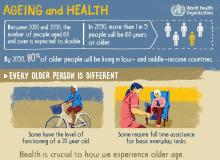
Message of Dr Sarah Barber, Director of the WHO Centre for Health Development
On 16 September 2019, Japan will celebrate “Respect for the Aged Day”, to honour the elderly. The WHO Centre for Health Development in Kobe (WHO Kobe Centre - WKC) is proud to be associated with this national day through Hyogo Prefecture, one of our key benefactors and the origin of this honourable tradition.
This year, WKC is especially proud to be celebrating 20 years of research on promoting healthy ageing and health equity by the Japan Gerontological Evaluation Study (JAGES), a project which WKC has supported on various occasions over the past 10 years. JAGES began in 1999 as a multidisciplinary project focusing on social welfare, public policy, health sciences and evaluation research. From only two municipalities in 1999, the survey has expanded to 41 municipalities across Japan with about 200 000 older people in 2016-17.
JAGES has produced quality scientific evidence on what promotes good health among older people. The evidence generated by this research has been important in influencing policy-makers to introduce policies and practices that impact positively on people’s health.
For instance, research findings from the population surveys have continuously contributed to improving policies for providing long-term care in Japan. These include the national health policy “Health Japan 21 (2013-2022)”, and the development of a new long-term care policy.
Collaboration with multiple departments in local government and non-public sector stakeholders has broadened the relevance of this research beyond health. It has informed guidelines by departments such as the Ministry of Land, Infrastructure, Transport and Tourism, and the Japan Sports Agency.
Importantly, this work has been acknowledged globally, with over 50 academic awards since 2004, and the publication of more than 400 academic articles. The world is learning from Japan’s experiences. WKC is honoured to play a key role in transmitting those lessons from Japan to the world.
As we honour the elders in Japan today, we remind policy makers that the social well-being of older people can be improved even as their physical or mental health declines. Community-based programmes for older people will help keep them active and prevent dementia, and all elderly people should be included in prevention efforts, not just those at risk of declining health.
For communities, building good relationships can help everyone live long and be healthy. Reaching out to older people who are isolated will help to support them to be part of the community. Spaces for people to gather to enjoy company will contribute to these efforts.
For individual elderly people, interacting with other people daily can help them stay active and healthy. This could include eating with others to make them happier and healthier. And being a good neighbour can help keep the doctor away!
We treasure the elderly people in Japan, and thank them for their enormous contributions to society. We encourage younger generations to listen and learn from their wisdom, and support them in their golden years.
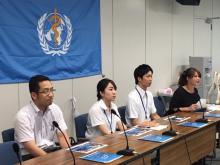
Hyogo Prefecture interns visit WKC
On 29 August, WHO’s Centre for Health Development in Kobe (WKC) hosted two interns of Hyogo Prefecture’s Medical Affairs Division as part of the curriculum of their internship. The students were accompanied by members of WKC's donor group, namely Hyogo Prefectural Government, Kobe City, the Kobe Chamber of Commerce and Industry, and Kobe Steel Ltd.
WKC’s Administrator, Mr Loic Garçon, welcomed the interns and presented on the work of WHO and the current priorities of WKC. The exchange that followed focused on WKC’s role as a global research centre and its contribution to WHO’s programme of work organized in three themes:
- Service delivery, sustainable financing and innovations, to help one billion more people with UHC. WKC is gathering country experiences and evidence on how health services are delivered to people in need to assist informed policy decisions, while sustainable financing of these services can promote access, quality and efficiency. Policy, system and technological innovations can solve specific problems to extend access, increase quality and empower consumers.
- Metrics and measurement, to study how global monitoring efforts for UHC can be refined to better reflect conditions prevalent among older persons, and how countries have monitored access to UHC in the context of ageing populations.
- Health emergencies and disaster risk management, to identify key data collection needs during emergencies to better inform effective responses. WKC is a partner of the WHO Thematic Platform for Health Emergencies and Disaster Risk Management (H-EDRM) research network.


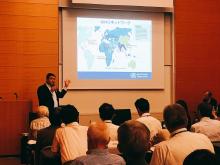
WKC presents at HAT Kobe’s Disaster Reduction Alliance Symposium
HAT Kobe, where WHO Kobe Centre is located, is a newly developed area through the reconstruction from the Great Hanshin Awaji Earthquake (GHAE). As part of the “build back better” initiative, Hyogo Prefecture invited numbers of international and domestic institutes involved in disaster risk reduction (DRR), including WHO, UNOCHA and UNDRR, to this area. To learn lessons from the GHAE, Hyogo Prefecture created a unique consortium of HAT Kobe institutes called the Disaster Reduction Alliance (DRA) to facilitate collaboration between them, including joint conferences and collaborative research.
On 27 August 2019, the DRA organized a symposium to introduce the member institutes’ DRR activities. Dr Ryoma Kayano, WKC’s focal point for Health Emergency and Disaster Risk Management (Health-EDRM), attended the symposium and gave a speech on WHO’s action to support the implementation of the Sendai Framework for Disaster Risk Reduction 2015-2030, including the establishment of a global research network on Health-EDRM.
“Disaster risk reduction is a multi-disciplinary activity involving stakeholders from different backgrounds. The impact of health disasters on people can be a bridge for different sectors to collaborate and build mutual understanding. WHO will work to improve scientific evidence in Health-EDRM through collaboration with global researchers,” said Dr Kayano.
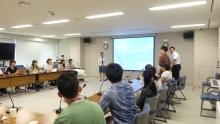
Japan’s Asian Medical Students’ Association visits WKC
On 22 August 2019, 23 health profession students representing the Asian Medical Students’ Association of Japan visited WKC to learn about global health and WHO.
Following the opening remarks by WKC Director, Dr Sarah Louise Barber, Dr Ryoma Kayano spoke about WHO’s “three billon goals” – to provide one billion more people with health coverage, one billion more people made safer, and one billion lives improved - as well as recent activities responding to dynamically changing global health requirements, and WHO Kobe Centre’s research projects.
He outlined some major achievements in WHO’s 70 year history, including that global life expectancy had increased from 48 years in 1948 to 71 years in 2018.
“WHO works to promote health, keep the world safe and serve the vulnerable. Your engagement is the key to achieve these goals,” Dr Kayano urged Japan’s future health care professionals.
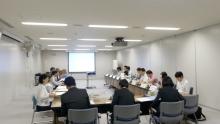
Donors express appreciation for WKC research and local collaboration
WKC’s senior management and representatives of the Kobe Group met on Friday, 26 July 2019 for the 14th Annual Programme Review Meeting to discuss the Centre’s activities over 2018 and review future plans.
WKC Director, Dr Sarah Barber, presented research activities according to three themes, with learning from Japan as a cross-cutting theme.
- Service delivery, sustainable financing and innovations: Three projects were concluded, and a further 12 projects are currently underway with local Japanese and international academic collaborators, the largest of which focuses on dementia.
- Metrics and measurement: The JAGES[1] study was completed and applied into practice in Kobe City. Five research projects are ongoing.
- Health emergencies and disaster risk management: This theme currently has six research projects underway, including the establishment of a research network, and a WHO book to guide research methods during health emergencies.
The output for the year included five new WHO publications, 9 journal articles, a book chapter, several technical reports, and policy briefs for all research projects.
Regarding local engagement, WKC organized five fora for the public and key stakeholders; presented lectures at 33 schools; revamped its website to improve outreach; and was mentioned in 25 media articles. The Centre is adding value by translating and disseminating WHO’s Disease Outbreak News for use throughout Japan, and participates actively in local committees and capacity development programs.
Speaking for the Kobe Group, Dr Wakiko Ajiki of Hyogo Prefectural Government greatly appreciated WKC’s collaboration in the Kansai region and Japan, in particular the WKC fora, the dementia project and the Centre’s dissemination of information on communicable diseases and disaster management.
The Kobe Group welcomed WKC’s progress over the past year and offered its support to disseminate research more broadly and deepen research collaborations even further.
The Kobe Group provides generous material and financial support to the work of WKC and comprises Hyogo Prefectural Government, Kobe City, the Kobe Chamber of Commerce and Industry, and Kobe Steel Ltd.
[1] Japan Gerontological Evaluation Study
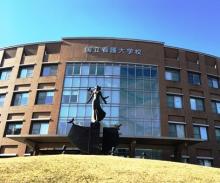
WKC lecture at National College of Nursing, Japan urges nurse engagement for improving global health
23 July 2019, National College of Nursing, Japan
Dr Ryoma Kayano, technical officer at the WHO Centre for Development (WKC), was invited to give a lecture on global health and WHO at the National College of Nursing in Tokyo, Japan.
He introduced key events in global health history, emphasizing global society’s efforts to achieve the Millennium Development Goals and Sustainable Development Goals. With Universal Health Coverage a key target of SDG Goal 3 “to ensure healthy lives and promote well-being for all at all ages”, Dr Kayano also highlighted WKC’s research activities on UHC in the light of population ageing.
“WHO works for the attainment by all peoples of the highest possible level of health. Nurses are central to countries’ efforts to achieve UHC. We need your future engagement, providing effective and quality care for people of all ages, for the improvement of global health”, said Dr Kayano.
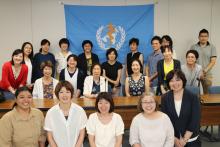
Nurses have a critical role in advancing universal health coverage
Nurses have a critical role in advancing UHC in Japan and other countries. This is the view of Dr Etsuko Kita, Chair of the Sasakawa Health Foundation whose training programme for nurse entrepreneurs has led to nurses establishing over 50 home-care nursing centres across Japan.
Dr Kita, formerly Chief of Field Support and Logistics in the Division of Emergency and Humanitarian Action at WHO in Geneva, brought 20 prospective nurse entrepreneurs to WKC on 1 August as part of their Kansai study tour to learn about WHO and WKC’s work, especially on population ageing.
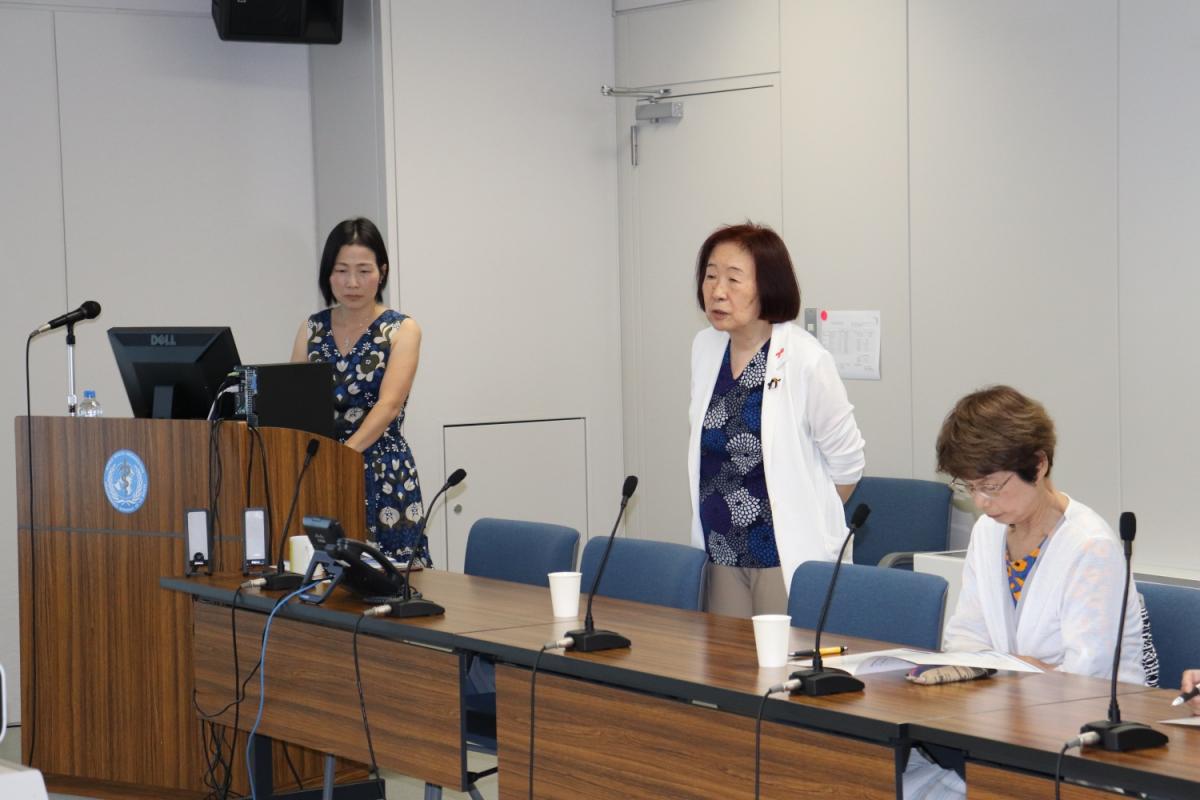
WKC’s expert on metrics and measurement, Dr Megumi Rosenberg, gave an overview of WHO, its priority agenda on Universal Health Coverage (UHC), and discussed the global trend in population ageing. She presented examples of WKC’s work on advancing UHC for ageing populations, and focused on metrics and measuring progress in this area.
With the programme now in its sixth year, Dr Kita emphasized the need for generating quality data from home-care nursing centres to develop an evidence base for improvement, and so contribute to advancing UHC in Japan.
Dr Rosenberg concurred, adding that the nurse entrepreneurs have a great opportunity to measure the impact of their innovative work and share important lessons learned with the global health community.
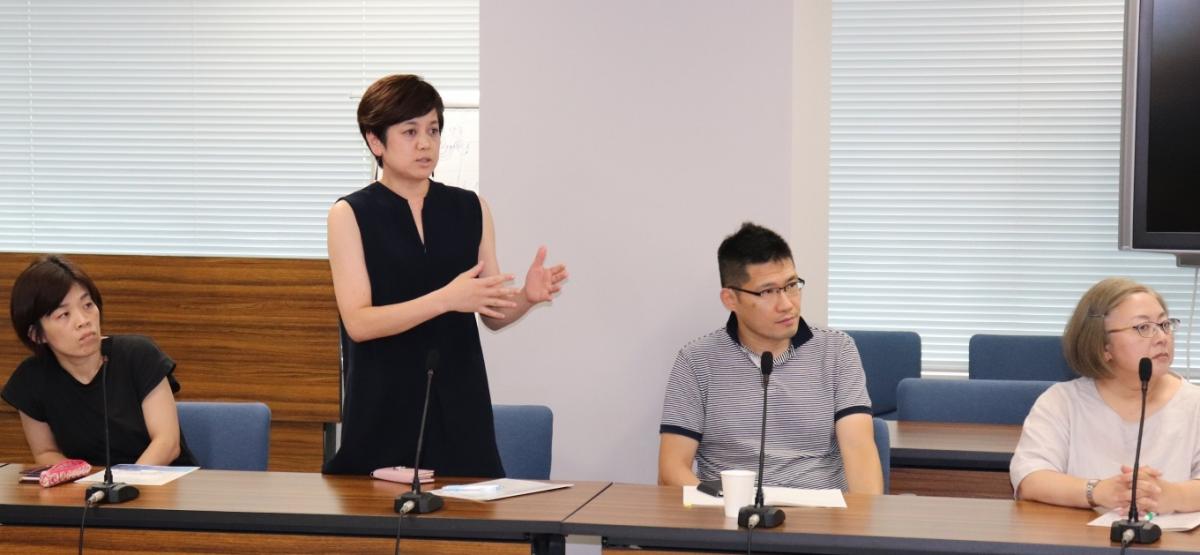
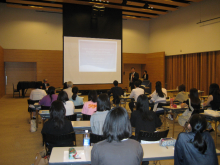
WKC addresses inaugural Global Health Students’ Seminar, Kobe
Dr Ryoma Kayano was invited to give a keynote speech at the First Global Health Students’ Seminar on Disaster Medical Care for the Elderly, organized by The Hong Kong Polytechnic University and Konan Women’s University.
He talked about the recent increasing number and impact of natural disasters, and highlighted the urgent need for disaster risk management in light of the health consequences of these events. He also discussed global rapid population ageing and the importance of identifying and addressing the health needs of older populations during and after disasters.
“The health needs of sub-populations, including older people, during and after emergencies and disasters requires more research and practice. The WHO Kobe Centre is conducting collaborative research on this with international academia, for better policy and practice in managing vulnerable sub-populations,” said Dr Kayano.

WKC presents keynote speech at Kyoto University
WKC’s technical lead for Disaster Risk Management, Dr Ryoma Kayano, gave the keynote speech at the Memorial Symposium for the establishment of a new collaborative research area between disaster risk reduction and disaster medicine held by Kyoto University.
He introduced the concept of Health Emergency and Disaster Risk Management (Health-EDRM) as part of WHO’s support to implement the Sendai Framework for Disaster Risk Reduction 2015-2030, and discussed the WHO Health-EDRM Framework and activities of the WHO Thematic Platform for Health-EDRM Research Network (TPRN).
“The preliminary key research priorities, identified during the expert meeting at the Asia Pacific Conference on Disaster Medicine, will be updated regularly through the work of TPRN. We very much look forward to working with local, national and international researchers to improve scientific evidence in Health-EDRM,” said Dr Kayano. Click here to see the preliminary research priorities.
Discussing the new research collaboration were (L-R in the photo) Mr Norio Suzuki (NTT Data Institute of Management Consulting, Inc.), Dr Ryoma Kayano, Dr Masahiro Kurata (Kyoto University), and Dr Shigeru Otsuru (Kyoto University)


